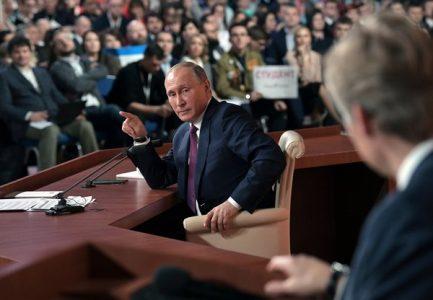
Kremlin: CIA helped and preventet terrorist attack in the northern Russian city of St.Petersburg
President Vladimir V. Putin called President Trump on Sunday to thank him for the work of the Central Intelligence Agency in helping prevent an Islamic State attack in the northern Russian city of St. Petersburg.
In rare words of praise for the C.I.A., Mr. Putin said the agency had provided information that “helped detain terrorists planning explosions,” the Kremlin said in a statement posted on its website. The attackers planned to strike crowded sites including Kazan Cathedral, a landmark Orthodox Christian church, the statement said.
“The information received from the C.I.A. was sufficient to search for and detain criminals,” the statement said. “The head of the Russian state asked the American president to convey words of thanks to the director of the C.I.A. and the American intelligence officers who received this information.”
The attack was described as imminent. It was said to be planned for Sunday — just two days after the first arrests were made on Friday. It was not clear when the C.I.A. provided the tip.
The Kremlin announcement offered no details on what information the C.I.A. had forwarded to the Federal Security Service, the main successor agency to the K.G.B. American intelligence agencies typically view the Russian agency as an adversary, even while cooperating in counterterrorism operations.
Continue reading the main story
During the call, Mr. Putin assured Mr. Trump that Russian intelligence agencies would similarly share information about terrorist threats to the United States, the Kremlin statement said.
Earlier, Russian media had reported the takedown of a terrorist cell in St. Petersburg without noting the tip from the C.I.A. The Federal Security Service, which is also known as the F.S.B., detained seven suspects who planned a wave of bombings, the Interfax news agency reported.
Russia has been plagued by terrorist attacks from some of the same Islamist groups that the United States tracks, such as the Islamic State. The Islamic State, for example, claimed responsibility for downing a Russian airliner over Egypt in 2015, killing all 224 people aboard.
It was not immediately clear where the plot originated — or how the C.I.A. learned of it — but Russian media reports identified a bomb maker with an ethnic Russian name, and other participants from two mostly Muslim regions in the Caucasus Mountains in southern Russia. That suggests that most of the suspects are Russian citizens. Another suspect was described as a native of Tajikistan, in Central Asia.
In 2011, the Federal Security Service warned the F.B.I. that an immigrant from Russia living in Boston, Tamerlan Tsarnaev, had associated with Islamist militants. The F.B.I. investigated the tip but closed the case after finding no proof. Two years later, Tamerlan and his brother Dzhokhar detonated homemade bombs at the Boston Marathon.
But the intelligence exchange that stopped the St. Petersburg attack was a rare recent example of publicly known cooperation between the two spy agencies.
Relations between Russia and the United States went into a deep freeze during the Ukraine crisis. Today, the United States military is training Ukrainian soldiers to fight Russian-backed separatists and, according to the American government, active-duty Russian soldiers in the eastern Ukraine war.
The United States and Russia also back opposite sides in the Syrian civil war.
And the cooperation that thwarted the St. Petersburg attack came after the C.I.A., in a joint report with other American intelligence organizations, identified the Federal Security Service as one of two Russian agencies that hacked the computers of the Democratic National Committee during the 2016 election.
The goals of the Russian operation, according to the report, were to diminish American confidence in elections and help the candidacy of Mr. Trump. The report, though, implicated not the F.S.B. but the main Russian military intelligence agency as the organization responsible for the so-called active measures phase of the operation — the leaking of data stolen from the Democratic Party to help the Trump campaign.
Source: NY Times





